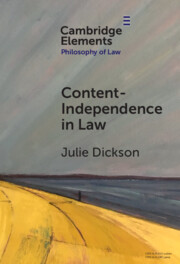Element contents
Content-Independence in Law
Published online by Cambridge University Press: 27 November 2024
Summary
- Type
- Element
- Information
- Series: Elements in Philosophy of LawOnline ISBN: 9781009000673Publisher: Cambridge University PressPrint publication: 19 December 2024
References
- 2
- Cited by

